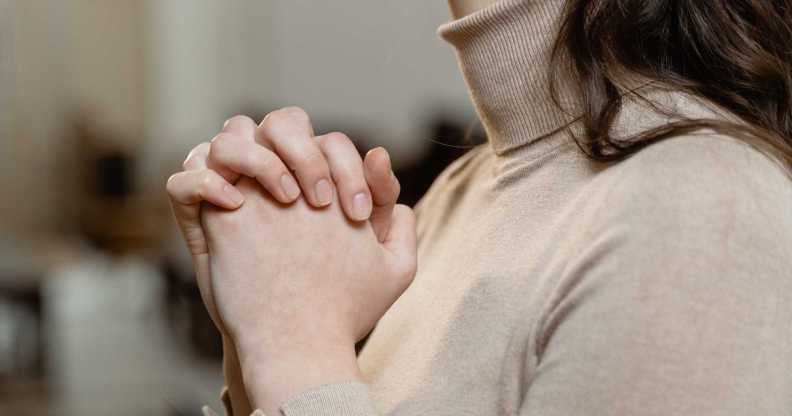Majority of LGBTQ+ people are not religious, ‘unsurprising’ census data reveals

File image of a person praying (Pexels)
The majority of gay, lesbian, bisexual and trans people in England and Wales do not describe themselves as belonging to a religion, new figures from the Office of National Statistics (ONS) have shown.
The data was published on Tuesday (4 April), as part of a release which combines sexual orientation and gender identity statistics with variables collected in the 2021 census.
The breakdown of religious identity by sexuality and gender is a first of its kind by the ONS.
Within the data, 10 categories were used to identify religious beliefs: none, Christian, Buddhist, Hindu, Jewish, Muslim, Sikh, other, not answered and does not apply.
The figures revealed that 63 per cent of LGB people and 36 per cent of trans people have “no religion”. Meanwhile, the over-all census results for England and Wales showed that 37 per cent of the total population are not religious.
Of LGB people and trans people who do identify as having a religion, Christian was the most common answer. Thirty-six per cent of trans people and 26 per cent of LGB people identified as Christians.
Two per cent of LGB people and 15 per cent of trans people identified as Muslim, while six per cent of LGB people and 10 per cent of trans people ticked “other religion”.
Gay Christian and former government equalities advisor Jayne Ozanne said it was no surprise that a majority of LGBTQ+ people are not religious given how “most religions judge, condemn and ostracise” the community.
“While it should be remembered that questions regarding sexuality and gender identity were voluntary, with those who are conflicted or nervous about openly self-identifying most likely to be religious and therefore not included in these statics,” she told PinkNews.
“It is a fact that many LGBT+ people leave their faith communities because of the way they are treated by them.”
Needs of non-religious LGBTQ+ people ‘overlooked’
This was echoed by Nick Baldwin, LGBT Humanists co-ordinator.
“That most LGBT people are non-religious is no surprise, given the history of homophobia, biphobia, and transphobia by many religious groups,” he said.
“‘There’s been a lot of focus over the years from national and local governments and others on the needs of religious LGBT people, particularly making the point that it’s possible to be both Christian and LGBT, or Muslim and LGBT, or of another faith and LGBT. That work is generally worthwhile and commendable.
“But the facts that most LGBT people are non-religious, and that non-religious LGBT people might have specific needs, are often overlooked.”
“One example of that is with respect to legal recognition of humanist marriages. We hope the census results will mean we are overlooked no longer.”
The 2021 census was the first to include questions about sexuality and gender identity, giving a clearer indication of the LGBTQ+ population in the UK.
Results showed that 1.5 million are LGB+ while around 262,000 people said they are trans.
It has been pointed out that a large number of people left these optional questions blank, meaning the LGBTQ+ population is likely to be larger.

